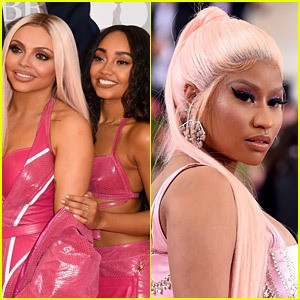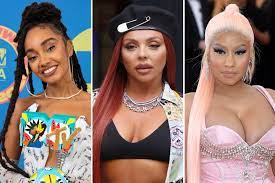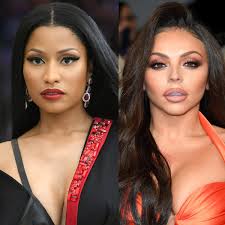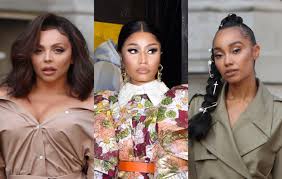Greetings, everyone, and welcome. Today, there’s some intriguing news unfolding between the UK pop sensation Little Mix and their former bandmate Jesy Nelson. Adding fuel to the fire, Nicki Minaj has stepped in to defend Jesy, even taking aim at one of Little Mix’s members, Leanne Pinnock. For those who aren’t up to speed, let’s delve into the details.
Firstly, who is Jesy? Jesy was once a vital part of the girl group known as Little Mix before embarking on a solo journey. Recently, she released a new single titled “Boys” featuring Nicki Minaj, which has been garnering attention. However, it appears that her former bandmates aren’t entirely thrilled about her solo success. Speculations arose when fans noticed that all members of Little Mix had unfollowed Jesy on Instagram. Yet, rumors suggest that Jesy may have actually blocked them instead of the other way around.

In my recent video, I delved into the departure of Jesy Nelson from her group, Little Mix. While Jesy cited her mental health as a primary reason for leaving, I suspected there was more to her decision. It seemed she also craved a solo path, weary of constant comparisons within the group. While Jesy’s desire for independence is understandable, her abrupt departure from the group left a sour taste. She severed all ties, ceasing communication and even unfollowing her former bandmates. Rumors circulated that she had blocked them. A TikToker purportedly revealed DMs from Leanne, one of the group members, expressing Jesy’s drastic actions. It’s evident Jesy has distanced herself from her former friends, a saddening outcome considering their close bond. Initially, Jade, Leanne, and Perrie supported Jesy’s departure, believing it was for her mental well-being. However, they were blindsided by her solo ambitions. Now that Jesy has embarked on her solo career, tensions have arisen. The remaining members are not receptive to her endeavors, feeling hurt and betrayed by her actions. Perrie even went as far as unfollowing anyone associated with Jesy, including their makeup artist, manager, and choreographer. Additionally, Leanne appears displeased with Jesy’s video release.
When Jesy released her video, Leanne shared a speech by Amanda Seales from the BET Social Awards on her IG story: “Pride in our power, strengthen our strides. You can attempt to imitate, but soul you cannot buy.” She also liked a video by social commentator Zizi Mills, who pointedly referenced Jesy. Jesy’s complexion is similar to Nicki’s, and there’s a trend of white women trying to appear racially ambiguous for perceived benefits. Leanne not only liked Mills’ post but allegedly DM’d a fan, urging them to call out Jesy. No Hun, a big Little Mix fan on TikTok, reportedly wanted to post a dance video to Jesy’s new song “Boys,” but Leanne allegedly intervened, suggesting a video about Jesy’s alleged “blackfishing” instead. She also claimed Jesy blocked her and her group, labeling her a “horrible person.” While it’s understandable that emotions run high within Little Mix, Leanne’s alleged actions, if true, raise concerns. Assuming these claims are true, her approach may be perceived negatively, potentially fueling narratives of jealousy or hate. Such behavior may not align with professionalism, despite the emotional context surrounding the situation.

There’s been quite a bit of discussion surrounding Jesy and accusations of her “blackfishing.” Frankly, this dialogue doesn’t catch me off guard, as I foresaw this issue arising when I first watched her “Boys” video. It was evident it would stir controversy, given Jesy’s identity as a British white woman now repositioning herself as an urban artist, adopting a racially ambiguous appearance and perpetuating black stereotypes to gain cultural capital. Naturally, this doesn’t sit well with everyone. On the other hand, I acknowledge Jesy’s deep admiration for black culture, as she confessed in her recent Vulture interview, expressing her love for black music and upbringing steeped in it. While being influenced by a culture is acceptable, presentation matters. Take Jojo, for instance; she’s a respected R&B artist who doesn’t indulge in cultural appropriation. She doesn’t play dress-up as a woman of color for acclaim, demonstrating respect for the culture. Jesy, however, crosses the line, appearing tone-deaf and oblivious, thus inviting backlash. It’s my hope that this criticism prompts her to reconsider her branding approach. Jesy possesses talent, but it risks being overshadowed if she persists in her current direction.
Shifting gears to Leanne, when rumors surfaced about her allegedly messaging a TikToker, word reached Jesy and Nicki Minaj. Nicki came to Jesy’s defense, taking a swipe at Leanne with her remark:
“When someone suddenly starts undermining you after being in your corner for years, it’s like they’re wearing a big red clown nose and clown shoes. Why wait until you part ways to start spreading negativity? If you had an issue with me, why keep doing business together for a decade? It’s hypocritical. I’ve seen too many people switch sides when it suits them. Suddenly embracing a cause when it becomes trendy? That’s not genuine. If you’ve been silent for years and only speak up when it benefits you, it’s disingenuous. If you want a solo career, just own it. You don’t need to tear someone else down to build yourself up. If you felt that strongly, why hide behind a group for so long?”

So, here’s Nicki’s response to Leanne. I get that Nicki has history with Jesy, and she feels compelled to defend her. But it bothered me to see her come down so hard on Leanne, especially considering how Leanne and her bandmates stood up for Nicki when she was feuding with Cardi on social media a few years back. Calling Leanne a clown seemed uncalled for. It didn’t sit well with me at all. Now, I’m not condoning Leanne’s alleged DMs urging people to call out Jesy. I think that’s unnecessary too. However, Leanne has every right to be upset about Jesy’s obvious cultural appropriation. Sure, she stayed silent about it for too long, but she eventually spoke up. As she mentioned, “I was in a group with two women of color for nine years, and it was never brought up to me up until the last music video that I did with them, when she, like, messaged me and said, like, ‘Jesy, I just want to make you aware that, like…'”
In her recent revelation, Jesy acknowledged that Leanne had brought to her attention her practice of blackfishing. Now, some observers might question the significance of this issue, wondering why it matters. My response is this: an individual’s choice in appearance and style is ultimately their own affair; they have the right to present themselves as they see fit. However, when we widen our perspective to encompass the broader industry landscape, a troubling pattern emerges. There’s a discernible agenda at play, one that seeks to marginalize black artists from representing their own music and culture authentically.

Consider white artists like Jesy and others who effortlessly achieve success by delving into soul music and adopting black aesthetics as if they were costumes, earning accolades in the process. Conversely, genuine black women often don’t receive the same level of promotion or recognition as non-black artists who mimic their style. Leanne has even produced a comprehensive documentary on this subject titled “Race, Pop, and Power.” If you haven’t watched it yet, I highly recommend it. It delves into issues ranging from colorism to outright racism, shedding light on the struggles faced by black women in the UK music scene. Many feel compelled to dilute their black identity and conform to a whitewashed sound in order to gain acceptance. Meanwhile, white and non-black pop stars receive widespread promotion and acclaim for appropriating elements of black culture, effectively demonstrating society’s affinity for black culture while simultaneously disregarding the black individuals behind it.
“My reality is one of loneliness as I tour predominantly white countries. Singing to fans who seem not to see me, hear me, or cheer me on leaves me feeling disconnected. Anxiety creeps in before fan events and signings, as I perpetually feel like the outsider. I’m constantly aware that I must work ten times harder and longer just to carve out my place in the group, as my talent alone isn’t deemed sufficient. Winning the X Factor at 19, I was told that, because I’m black, I’d have to exert ten times the effort of my white counterparts due to the color of my skin. I was instructed not to wear braids or afros, to conform to a standard of appearance tailored to white sensibilities. Suggestions to bleach my skin and remarks about being too dark to succeed in the industry still haunt me. These experiences robbed me of my confidence and my identity.

These snippets of my story are just glimpses into the broader challenges faced by black artists in the music industry. It’s an uphill battle. Sadly, it often seems that people prefer to support non-black artists who appropriate elements of black culture rather than backing genuine black talent, particularly dark-skinned female artists. It’s a disheartening reality. But I’d like to hear your thoughts on this issue. Please engage with the discussion below—like, comment, and subscribe. Share this video if you resonate with its message. Thank you for watching, and until next time. Goodbye!”
